|
|
|
Sort Order |
|
|
|
Items / Page
|
|
|
|
|
|
|
| Srl | Item |
| 1 |
ID:
144541
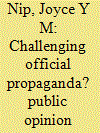

|
|
|
|
|
| Summary/Abstract |
This article examines the prominence of various user categories as opinion leaders, defined as initiators, agenda setters or disseminators, in 29 corruption cases exposed on Sina Weibo. It finds that ordinary citizens made up the largest category of initiators but that their power of opinion leadership was limited as they had to rely on media organizations to spread news about the cases. News organizations and online media were the main opinion leaders. Government and Party bodies initiated a fair number of cases and, despite not being strong agenda setters or disseminators, were able to dominate public opinion owing to the fact that news organizations and online media mainly published official announcements about the cases. Media organizations also played a secondary role as the voice of the people. While individuals from some other user categories were able to become prominent opinion leaders, news workers are likely to be the most promising user category to challenge official propaganda.
|
|
|
|
|
|
|
|
|
|
|
|
|
|
|
|
| 2 |
ID:
139639
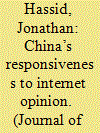

|
|
|
|
|
| Summary/Abstract |
Despite its authoritarian bent, the Chinese government quickly and actively moves to respond to public pressure over misdeeds revealed and discussed on the internet. Netizens have reacted with dismay to news about natural and man-made disasters, official corruption, abuse of the legal system and other prominent issues. Yet in spite of the sensitivity of such topics and the persistence of China’s censorship apparatus, Beijing usually acts to quickly address these problems rather than sweeping them under the rug. This paper discusses the implications of China’s responsiveness to online opinion. While the advantages of a responsive government are clear, there are also potential dangers lurking in Beijing’s quickness to be swayed by online mass opinion. First, online opinion makers are demographically skewed toward the relative “winners” in China’s economic reforms, a process that creates short-term stability but potentially ensures that in the long run the concerns of less fortunate citizens are ignored. And, second, the increasing power of internet commentary risks warping the slow, fitful – but genuine – progress that China has made in recent years toward reforming its political and legal systems.
|
|
|
|
|
|
|
|
|
|
|
|
|
|
|
|
| 3 |
ID:
121207
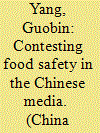

|
|
|
|
|
| Publication |
2013.
|
| Summary/Abstract |
Food safety is a matter of intense contestation in the Chinese media. Through three case studies, this article shows that government and corporate elites strive to maintain media hegemony while citizen-consumers and activists engage in counter-hegemonic practices. Under conditions of hegemony, citizen dissent is most likely to take one of two forms: diffused contention or radical protest. Like the yin and yang of civic dissent, these two forms are both the results of, and responses to, state and corporate hegemony.
|
|
|
|
|
|
|
|
|
|
|
|
|
|
|
|
| 4 |
ID:
187412


|
|
|
|
|
| Summary/Abstract |
History textbooks are the only history books that the majority of people read in their lives. This article investigates the impact of history textbooks on young Chinese people's understanding of their nation's modern history, as revealed on the popular microblogging site Sina Weibo. We analysed posts related to history textbooks and their representations of three contentious turning points in the communist historical narrative: the May Fourth Movement of 1919, the nationalist assault on the communists in 1927, and the Yan’an Rectification Movement of 1942. Widespread engagement with and recollection of history textbook content indicates a substantial impact of these textbooks on people's understanding of the past and a willingness to relate that past to the present. Responses to textbooks vary widely, from acceptance of the textbook narrative and the expression of strong patriotic and emotional connections to the past as presented in textbooks to open and angry critique.
|
|
|
|
|
|
|
|
|
|
|
|
|
|
|
|
| 5 |
ID:
118675
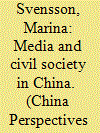

|
|
|
|
|
| Publication |
2012.
|
| Summary/Abstract |
Although Chinese journalists are not able to create their own independent organisations, they are engaging in informal networking on-line and off-line that has created a strong sense of community among investigative journalists in particular. Through sharing experiences, stories, and struggles, journalists create a collective identity and define their roles in society. Earlier studies of Chinese journalists haven't explicitly addressed the issue of how a journalistic community is created and sustained in a society that lacks freedom of the press and where freedom of association is severely restricted, and the importance of new information and communication technologies (ICTs) in this context, which is the focus of this article. Furthermore, it is important to study the extent to which and how investigative journalists network with other groups in society, including lawyers, public intellectuals, and civil society organisations. With the development of micro-blogging (weibo) we see new forms of community building, more open expressions of solidarity and ironic resistance, as well as increasing levels of interactivity between different groups in society. By reporting on injustices and the situation of marginalized groups in society, and commenting on public events on weibo, investigative journalists interact with many different groups in society and become part of a larger community of people who share the same ideals and struggles. Some journalists go one step further and set up or become actively involved in charity work and civil society organisations.
|
|
|
|
|
|
|
|
|
|
|
|
|
|
|
|
| 6 |
ID:
161261
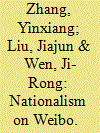

|
|
|
|
|
| Summary/Abstract |
It appears that nationalism has been on the rise in China in recent years, particularly among online communities. Scholars agree that the Chinese government is facing pressure from online nationalistic and pro-democracy forces; however, it is believed that of the two, nationalistic views are the more dominant. Online nationalism is believed to have pushed the Chinese government to be more aggressive in diplomacy. This study challenges this conventional wisdom by finding that online political discourse is not dominated by nationalistic views, but rather by anti-regime sentiments. Even when there is an outpouring of nationalist sentiment, it may be accompanied by pro-democracy views that criticize the government. By analysing more than 6,000 tweets from 146 Chinese opinion leaders on Weibo, and by decomposing nationalistic discussion by specific topic, this study shows that rather than being monolithically xenophobic, nationalists may have differing sets of views regarding China's supposed rivals. Rather than being supportive of the regime, nationalists may incorporate liberal values to challenge the government. Nonetheless, this liberal dominance appears to provoke a backlash of nationalism among certain groups.
|
|
|
|
|
|
|
|
|
|
|
|
|
|
|
|
| 7 |
ID:
144537


|
|
|
|
|
| Summary/Abstract |
During August and September 2012, Sino-Japanese conflict over the Diaoyu/Senkaku Islands escalated. Alongside street demonstrations in China, there was an outpouring of public sentiment on China's leading micro-blog, Sina Weibo (微波). Using human and computer-assisted content analysis, we exploit original Weibo data to measure how public sentiment in China fluctuated over the dispute, and ask two questions. First, how cohesive and volatile were online nationalist sentiments? Second, we measure government censorship of Weibo in order to ask which sentiments did authorities allow to be expressed, and when? We first find that many of the micro-bloggers' harshest invective was directed not at Japan but at their own government. Second, while censorship remained high across topics for most of the dispute, it plummeted on 18 August – the same day as bloggers' anger at Beijing peaked. These observations suggest three theoretical explanations: two are instrumental-strategic (“audience costs” and “safety valve”) and one is ideational (elite identification with protesters).
|
|
|
|
|
|
|
|
|
|
|
|
|
|
|
|
| 8 |
ID:
138594
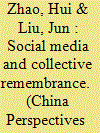

|
|
|
|
|
| Summary/Abstract |
This paper provides one of the first studies on the role of social media in articulating individuals’ experiences and memories and (re-)shaping collective memory in contemporary China. It investigates how social media enable and facilitate the participation of ordinary citizens in distributing and accumulating alternative narratives and memories of the past against the authoritarian version by taking the debate over China’s Great Famine – a topic long considered a political taboo – on Sina Weibo, one of the country’s most popular social media sites, as the case study. This study demonstrates that weibo provides people with an alternative communicative sphere for sharing previously suppressed, marginalised, “unofficial” memories as civil disobedience and accumulating them into an alternative collective memory that is relevant to the changing socio-political context of China.
|
|
|
|
|
|
|
|
|
|
|
|
|
|
|
|
| 9 |
ID:
139640


|
|
|
|
|
| Summary/Abstract |
China’s local governments are facing a crisis of public confidence and have struggled to handle political dissent and popular protests. In an attempt to promote political stability, local officials around the country have utilized Twitter-like microblog sites (微博, weibo) to upgrade their capability to influence citizens and engage in rapid information management. Through the analysis of microblogging by prominent propagandists whose identities and professions are known to the public, this article finds some evidence that microblogging could be helping cadres to win hearts and minds, although such microblogging poses new risks to the state as netizens challenge propagandists and state policies in exchanges that reveal political pluralism and disapproval of state policies. While venting on weibo may enable people to blow off steam, the reluctance (or inability) of official microbloggers to engage their critics in meaningful dialogue suggests the limited utility of official microblogging as a means of furthering political stability through the improvement of state–society relations.
|
|
|
|
|
|
|
|
|
|
|
|
|
|
|
|
|
|
|
|
|